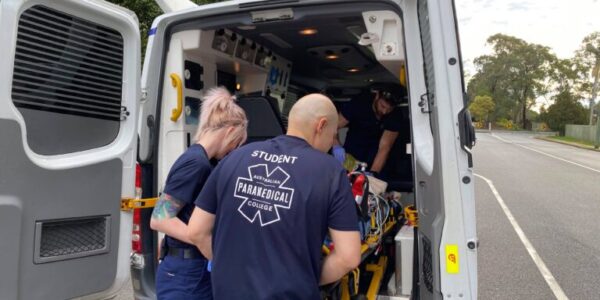What is a Medical Emergency Services Officer (MESO/ESO)?
A Medical Emergency Services Officer (MESO) or Emergency Services Officer (ESO) is typically responsible for medical care (and sometimes fire rescue, security, training and WHS) on large industrial sites, particularly mine sites.
Generally sitting within the mine safety team, most sites have medics on-site to assist in the medical treatment of both minor and major injuries as well as offer basic life support when needed.
For many people, becoming a MESO/ESO is a popular alternative to becoming a Paramedic. While the scope of work may be different, both jobs have similar skill sets, and offer an opportunity to make a difference by providing emergency medical care.
MESOs can hold different titles, such as:
- Emergency Services Officer (ESO)
- Mine Site Medic
- Industrial Medic
- Underground Medic
- Mine Rescue Medic
- Emergency Response Coordinator
What industries does a MESO/ESO work in?
With skills in security, fire, rescue and medical, MESO/ESOs are valuable employees across a range of industries, including:
- Mining and metalliferous (above and underground)
- Maritime
- Power and energy
- Industrial
- Offshore oil and gas
- Defence
- Aviation
- Construction
Typical duties of a MESO/ESO
The duties of a MESO/ESO will vary depending on the size and location of the site you’re working on, your qualifications and the scale of the team/workforce you are responsible for.
Typical duties you may be required to undertake include:
- Injury management including liaising with patients, doctors and physiotherapists
- Undertaking random drug and alcohol testing
- Responding to minor or major on-site injuries and providing medical care
- Administer basic life support if necessary
- Mental health assessments and recommendations
- Responding to vehicle accidents, and much more
Average MESO/ESO salary
The average salary for a MESO/ESO in Australia is $110,000 – $140,000 per year.*
This amount may increase depending on your level of experience, industry you’re working in, overtime and additional allowances throughout the year.
*Jora (April, 2024)
How to become a MESO/ESO
Australian Paramedical College can help you build the foundational knowledge and practical skills you need to become a trusted MESO or ESO.
Generally, you’ll need to hold at least a HLT41120 – Certificate IV in Health Care to become a MESO.
However, the HLT51020 – Diploma of Emergency Health Care could give you a competitive advantage when applying for jobs, especially if you’re looking to explore other career pathways one day. It’s worth noting that some employers may require you to also hold further qualifications, like the Certificate III in Mines Rescue.
Working FIFO as an ESO while upskilling
Now a graduate and Trainer and Assessor, Nathan worked as a fly-in-fly-out Emergency Services Officer (ESO) in the mines in Western Australia while completing his studies at Australian Paramedical College.
Setting himself up for every future success, Nathan studied the HLT51020 – Diploma of Emergency Health Care to build on his current experience as an ESO.
He is an inspiration to many APC students who are looking to pursue a similar pathway and Nathan has shown that it is possible to follow your career dreams.
MESO/ESO skillset and qualities
Clinical expertise & medical knowledge
Use your existing skills and experience to continue delivering high quality medical care
Collaborative
Values teamwork and effectively collaborates with other emergency services, hospital staff and the local community when assisting with patient transfers
Effective decision making
MESOs are required to think quickly on their feet when dealing with medical emergencies, highlighting the essential nature of prompt and effective decision-making in the role.


